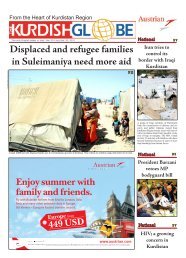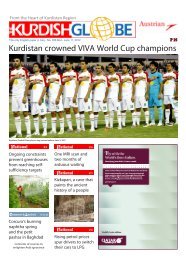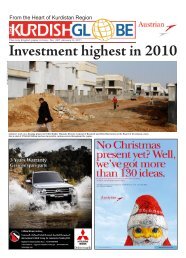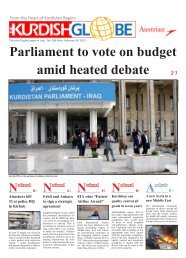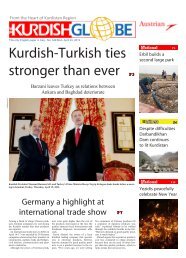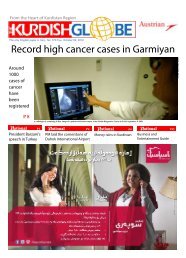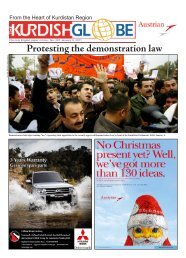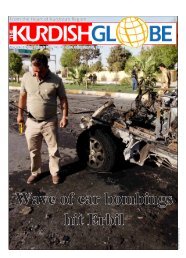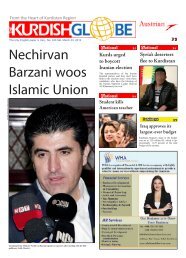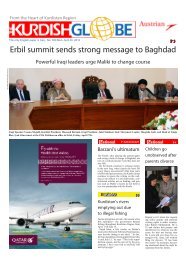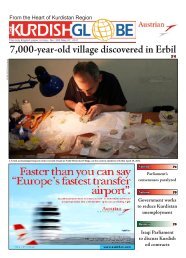National - Kurdish Globe
National - Kurdish Globe
National - Kurdish Globe
- No tags were found...
You also want an ePaper? Increase the reach of your titles
YUMPU automatically turns print PDFs into web optimized ePapers that Google loves.
The <strong>Kurdish</strong> <strong>Globe</strong> No. 345, Monday, March 26, 2012 9The article focuses on the successstory of a British-born Kurd who ismaking landmark changesLaween Atroshi, a 23year-old British born-Kurd who is outspokenby nature and an advoctcate of <strong>Kurdish</strong> prosperitity and development, isa clear example of theincreased role of youngKurds in today’s Kurditistan, although he admitswith laughter: “Prior tomy first visit to KurdistanI had quite a negative imptpression. I imagined Erbtbil International Airportto be tragic, but as soonas I landed I was like,‘Wow!’”Asked what he constsiders himself, withoutsecond thought he confidtdently replied: “A Kurdof course!” After a momtmentary pause, he added,“Regardless of where aKurd is born, he or sheis a Kurd.” His story issimple: With knowledge,information and muchexperience in a develotoped country, there issomething that Atroshifeels he can contribute toKurdistan.The most significant ofcontribution to Kurdistanis that Atroshi recentlynominated the Sulaimatani Autism Center for theUnited Nations PublicService award--the most“prestigious internationalrecognition of excellencein public service” award,according to the UN. Thecenter has already movedinto the second phase ofthe competition.This nomination comeswith two significant andunique circumstances:First is the nominee,Laween Atroshi, a 23-year-old British-bornKurd who has only visiteted Kurdistan three timesin his life. The second isthe autism center itself.“Disability in Kurdisttan is looked down uponand shamed, and oftenthose who are autistic arelocked up; it is remarkatable for a center to existthat recognizes the existtence of this condition,”said Atroshi, admiring thevolunteers who foundedthe center.Recalling his return aftter his third visit to Kurditistan, Atroshi explained:“I came back to the UKthinking: They need recotognizing!” To furthersupport and encouragethe center, Atroshi nomintnated it for the UN award.As a rule, the nominatedinstitution has to be partof a country that is a UNmember. A proud Atroshiaffirmed that this is thefirst time such a nominattion was made in the histtory of Iraq.“We’re not in it to winit,” he said, although hereiterated the significtcance of being nominateted and the importance ofthe center in Kurdistan.“Family and relativesweren’t aware that theycould assist their autisticchildren until this centerwas established. Therewere also no mechanismsin place to promote socialinclusion prior to this inittiative. It is a step in thepromotion of equalitywithin these vulnerablechildren.”The Sulaimani AutismCenter was founded by anumber of mothers of auttistic children who raisedtheir concerns and reqtquested support from theKurdistan Save the Childtdren charity alongsidethe Ministry of Labor andSocial Affairs. Their conctcerns were heard, and itwas later concluded thatan autism center wouldbe beneficial.Being raised with paretents who possess a strongmedical ethos--a fatherwho is a doctor and amother with a backgtground in pharmaceutictcal science--Atroshi saidthat as a young child hisinterest was in technolotogy. Early on, he realizedhis interest would notdivert much from that ofhis parents as he blendedthe love for technologywith his interestin healthcare systems. “Naturallythe interest in technolotogy blended with the useof it in improving healthcare.”Having completed aBachelor of Science honotors degree in biomedicalinformatics (electronichealth care systems) atthe University of Londtdon and currently anapproved UK Health Inftformatician working at agovernment hospital as acritical care clinical audittor, Atroshi sees the gapsin Kurdistan’s health caresystem and is taking stepsto change that.“My plan is to introduceelectronic health care systtems as I feel Kurdistanhas the intellectual andphysical capacity to adoptsuch a system. But mostimportantly, I want toeducate the users throughworkshops, lectures anddifferent groups in howto use such systems andimplement so that theycan pass the skills on tofellow professionals.”His returns to Kurdisttan are packed schedulesin observing the existingsystem and meeting withpeople in the field to gaininsightful information. “Ifeel that one of the shortctcomings is the lack ofaccountability, transparetency and integrity. I alsofeel that there is a lack oftraining and resources forhealth care professionatals. For instance, stateof-the-arttechnology isbrought in, but is uselessas professionals are notable to use them due tolack of training. Thereis no accountability forprocedures that are perftLaween Atroshiformed.”Recently, KurdistanRegion has seen manyevents and changes thatare purely initiated by itsyouth living abroad. Suchinitiatives include the anntnual <strong>Kurdish</strong> festival inthe United States, andthe Vision Library, whichaims to establish the biggtgest library in Kurdistan.Nevertheless, the governmtment has been criticizedin the past for its lack ofsupport for <strong>Kurdish</strong> proftfessionals living abroad.In a recent article inThe <strong>Kurdish</strong> <strong>Globe</strong>,Chris Bowers, the BritishConsul General in Erbil,wrote: “The odd thingis when people return totheir country of origin,their host governmentaccepts them--except,it seems, in KurdistanRegion. Why does thisthriving, dynamic regionof Iraq not want those ofits citizens who can nolonger live in the UK orEurope back?” In his artticle, he refers to the UKasylum policy and Kurdsbeing sent back to Kurditistan.Rupak Mansour, a21-year-old student inKurdistan, stated, “Weneed those young peopleabroad to come back toKurdistan. Just like theinvestment law that atttracted much businessinto the region, a new lawor a system needs to beput in place to attract allthe <strong>Kurdish</strong> youth abroadto return and rebuild.”Referring to Atroshi’sachievements, she asstserted, “If Laween and afew others with the sameinterest as him returned,and the government madeit attractive for themto come back, then wewould see many quickand positive changes.”As for Atroshi, in summtming up the journey sofar, he said: “If you’re inKurdistan to purely serveand improve, then youwon’t be disappointed.”Although it is evident heis aware that his youthfuljourney of serving “backhome” will come withmuch cost, dedicationand, at times, frustration.Iraq VP demands probe into bodyguard's 'torture'Iraq's fugitive vice presitident on Sunday calledfor an urgent neutral inqtquiry into the death ofhis bodyguard, who wasallegedly tortured whilein custody.Vice President Tareqal-Hashemi, a Sunnithe authorities have acctcused of running deathsquads, said his lawyershad been restricted acctcess to the investigationagainst him and that the"situation in Iraq hasbecome intolerable."Hashemi alleges thathis bodyguard AmirSarbut Zaidan al-Battawi, who died in custtody earlier this month,was tortured, and hasreleased photographswhich he says supportthe claims.Security forces andjudicial officials sayBatawi died of kidneyfailure.Human Rights Watch,meanwhile, has calledfor a criminal investigtgation into the death ofthe 33-year-old fatherof-three."I ask all human rightsrelated organisationsin Iraq to take urgentactions by sending (a)neutral and specialisedcommittee to examinethe body medically andto identify the cause ofdeath," Hashemi said ina televised speech deltlivered in English."I also ask securityand judicial authoritiesin Iraq to provide an exptplanation for what happtpened."He said his lawyershad not been allowedto witness investigattion hearings, and whenthey were given accessto minutes of the heariting, judges barred themfrom taking notes ormaking copies."I beseech (the) intternational communityto take rapid action torectify (the) disastroussituation and status reltlated to human rights, asthe situation in Iraq hasbecome intolerable,"Hashemi said.A senior Iraqi generaland a judicial spokesmtman have said Batawidied of kidney failureand other conditions aftter refusing treatment,and suggested phottographs released byHashemi's office apparetently showing Batawi'sbody bearing signs ofabuse were digitallymanipulated.In December, shortlyafter US troops comptpleted their withdrawalfrom Iraq, the country'sShiite-led authorities isstsued an arrest warrantfor Hashemi on terrorcharges, sparking a prottracted political crisis.Hashemi, who hasbeen in Iraq's autonomtmous Kurdistan regionfor the duration of therow, says the allegattions are politically mottivated, and <strong>Kurdish</strong>officials have refusedto hand him over to thecentral government.AFP



